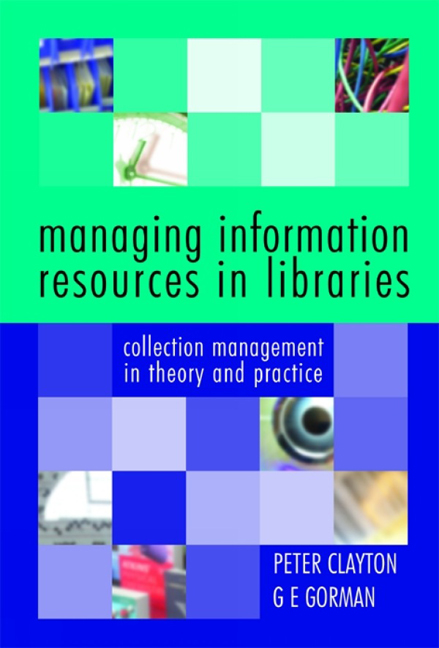Book contents
- Frontmatter
- Contents
- About the authors
- Preface
- 1 Managing information resources in context
- 2 Collection management and collection development policies
- 3 Conspectus
- 4 Resource sharing and co-operative collection development
- 5 Selection: policies and procedures
- 6 Selection resources
- 7 Acquisitions processes and procedures
- 8 Budget management
- 9 Collection evaluation and review
- 10 Preservation and weeding
- The literature of collection management Adela Clayton
- Index
1 - Managing information resources in context
Published online by Cambridge University Press: 08 June 2018
- Frontmatter
- Contents
- About the authors
- Preface
- 1 Managing information resources in context
- 2 Collection management and collection development policies
- 3 Conspectus
- 4 Resource sharing and co-operative collection development
- 5 Selection: policies and procedures
- 6 Selection resources
- 7 Acquisitions processes and procedures
- 8 Budget management
- 9 Collection evaluation and review
- 10 Preservation and weeding
- The literature of collection management Adela Clayton
- Index
Summary
Focus questions
• What is the role of the library in dealing with electronic information?
• What is the place of the library in the information transfer process?
• What links should a collection management area have with other areas of the library, and with the wider organization?
• What changes in the publishing industry are impacting on collections management?
Our world is being transformed by the increasing availability of electronic information. Whether one is seeking the complete works of William Shakespeare or the latest perinatal statistics, these are now available electronically – somewhere. As a result, libraries everywhere are shifting their focus from building up collections to providing access to information. Many colourful phrases have been devised to describe this shift: from the collection which includes a particular item ‘just in case’ it may be needed to the document delivery service which provides it ‘just in time’; or from the ‘warehouse’ to the ‘wherehouse’ approach.
The popular perception is that this growing availability of electronic information both renders traditional, primarily paper-based resources – and the libraries that house them – increasingly irrelevant, and that the new electronic information resources themselves offer simplicity and transparency in access and use. Both perceptions are wrong. Throughout history, there have been many examples of new communication technologies complementing rather than supplanting their predecessors. The invention of the printing press did not lead to the demise of the handwritten letter. When radio was first introduced it was expected that it would lead to the demise of the telephone: why talk to simply one other person, when you could talk to many at the same time? Ludicrous as this suggestion now seems, the point is that both radio and telephony best serve differing purposes. The same applies to electronic and paper-based media.
We are now living through a period of change when questions of which communication media are best suited for what purposes are still being assessed through a process of global trial and error. What is certain is that both paper and electronic forms will survive.
- Type
- Chapter
- Information
- Managing Information Resources in LibrariesCollection Management in Theory and Practice, pp. 1 - 15Publisher: FacetPrint publication year: 2006

